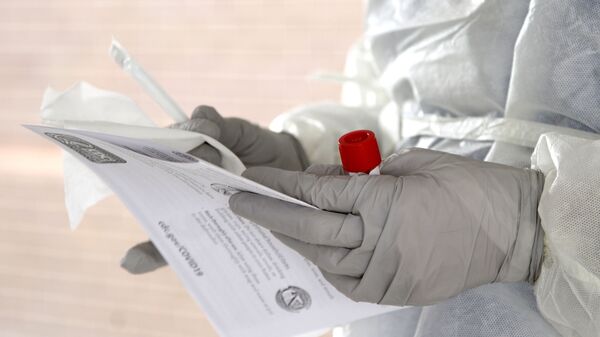Seven US states have banded together to establish a coordinated COVID-19 testing strategy and purchase 3.5 million antigen tests, a move that highlights the US’ lack of a national testing plan, Dr. Jason Kindrachuk, an assistant professor of viral pathogenesis at the University of Manitoba, told Sputnik’s Loud & Clear Wednesday.
‘An Unbelievable Amount of Sense’
The governors of Virginia, Louisiana, Massachusetts, Michigan, North Carolina, Ohio and Maryland have joined forces with the Rockefeller Foundation to expand the use of antigen tests in a bid to halt the spread of COVID-19. Most COVID-19 tests detect the virus’s genetic material and can take hours to run, but antigen tests, used to detect fragments of proteins found on or within the virus, can produce results in just a matter of minutes.
“Why is there this discrepancy across different nations with being able to get test results quickly, especially when we know that we’re under a time crunch to get this information back to people to basically try to curb transmission as quickly as possible?” Kindrachuk, the Canada research chair in molecular pathogenesis of emerging and reemerging viruses, told host John Kiriakou.
“And I don't quite understand what the logic is behind not trying to fast-track some of these analyses. We certainly have been able to do this in Canada and get results back very quickly to patients. It astounds me that the situation is still present seven months into this pandemic within the US,” Kindrachuk said.
“As somebody who spent 7.5 years in the US, there was certainly the capacity to do things on a very grand scale. And certainly in a time like COVID, when we’re seeing not only the price on human lives but also the economic toll, it makes an unbelievable amount of sense to try to get testing done as rapidly as possible. And the tests exist,” Kindrachuk added.
Over the last few months, health experts have urged for faster testing results to effectively curb the spread of the virus. According to a national health survey by researchers at Harvard University, Northeastern University, Northwestern University and Rutgers University, the majority of people who are tested for the virus in the US do not receive their results within the 24 to 48 hours, which is the timeframe recommended by health officials to stop the virus’ spread. The study also found that around 10% of people tested have to wait 10 days or more for their results, the New York Times reported.
Vaccine Race Separates Ideologues, Scientists
According to Kindrachuk, COVID-19 vaccine development is a “race against time.”
“I think what we’re seeing is a separation between kind of the political ideologies and unhappiness across different folks looking across different nations and the scientific community. And I think we are seeing a number of scientists that are looking globally and looking past these political boundaries and saying: ‘We don’t care who or what vaccine platform comes first, because we are likely not going to need just one,’” he said.
“We need multiple platforms that are going to be available for the broader community, because we’re not talking about a few hundred thousand or a few million vaccinations that need to be done. We’re talking about billions of doses that are going to be needed,” Kindrachuk noted, also explaining that scientists are still working to find out what vaccine strategy works best against COVID-19.
“When we look at these different vaccines and the different vaccine platforms that have been developed over the past decade or so, what we’re seeing is a lot of ingenuity in trying to understand what is the best way, essentially, to stimulate our immune system to develop a robust response. And what we’re seeing are different technologies that are being developed over the past few years that have actually shown quite a bit of promise.”
“A lot of this is trying to find which strategy is the best for COVID-19, because from virus to virus, it isn’t necessarily always the same type of vaccine that works,” Kindrachuk explained.
“There were at least some anecdotal reports that had come out saying that people who had recently gotten the MMR [measles, mumps and rubella] vaccine had less severe illness or seem to have some immunity against COVID-19. I don’t think we quite know. We do know that a lot of vaccines, they are specific, but they also stimulate the immune system, which may generate a nonspecific response that ends up providing us some other protection against other microbes or other bugs. It’s not a really well-established area of research yet,” Kindrachuk added.



